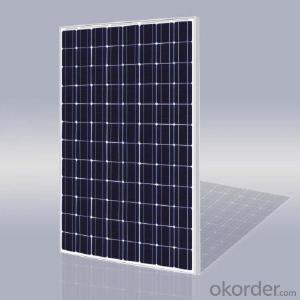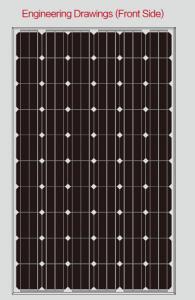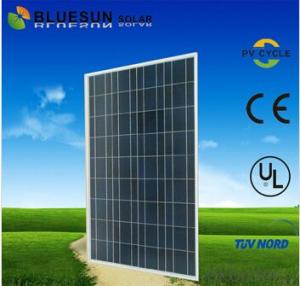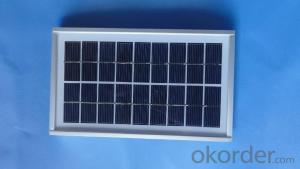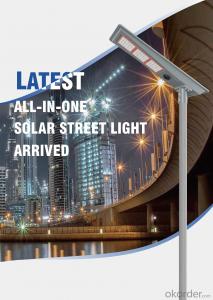SOLAR PANELS,SOLAR PANEL FOR HIGH EFFERENCY FULL CERTIFICATE
- Loading Port:
- Shanghai
- Payment Terms:
- TT OR LC
- Min Order Qty:
- 2650 watt
- Supply Capability:
- 26000 watt/month
OKorder Service Pledge
OKorder Financial Service
You Might Also Like
Item specifice
Product Description:
1.Structure of Solar Module Description
Solar panel refers either to a solar hot water panel, a common type of a solar thermal collector, or to one or more solar photovoltaics (PV) modules, electrically connected and mounted on a supporting structure.
A PV module is a packaged, connected assembly of typically 6×10 solar cells. Solar PV panels constitute the solar array of a photovoltaic systemthat generates and supplies solar electricity in commercial and residential applications. Each module is rated by its DC output power under standard test conditions, and typically ranges from 100 to 320 watts.
2.Main Features of the Solar Module
1).High conversion efficiencies resulting in superior power output performance.
2).Outstanding power output even in low light or high temperature conditions
3).Optimized design for ease of soldering and lamination
4).Long-term stability,reliability and performance
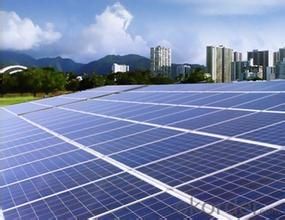
GENERAL SAFETY
1. Consult local codes and other applicable laws concerning required permits on regulations concerning installation and inspection requirements.
2. Before installation a PV module, contact appropriate authorities to determine permit, installation and inspection requirements that should be followed.
3. Install PV modules and ground frames in accordance with applicable rules and regulations
4. PV modules should be installed and maintained by qualified personnel. Only installer/service personnel should have access to the PV module installation site.
5. No matter where the PV modules are installed, either roof mounted construction or any other type of structures above the ground, appropriate safety practices should be followed and required safety equipment should be used in order to avoid possible safety hazards. Note that the installation of some PV modules on roofs may require the addition of fireproofing, depending on local building / fire codes.
6. Please use PV modules with same cell size within series.
- Q:Are solar panels worth the investment?
- Yes, solar panels are worth the investment. They offer long-term financial savings by reducing electricity bills and the potential for selling excess energy back to the grid. Additionally, they contribute to a cleaner and more sustainable future by reducing carbon emissions and dependency on fossil fuels.
- Q:I have a cabin that is way out in the middle of no where, it would cost 000's of dollars to get power to it. If I have a 8,000 BTU air conditioner that runs on 25 volts and 5 amps (or 875 watts)How many solar panels will I need to run this during the day, plus charge the batteries to run it all night? How many batteries would I need
- You would need 6 300 watt solar panels, US price around $300 per, And a minimum of 4 batteries. You are going to have major problems only having 5 hours of sun though.I am not sure you could get it to work with only that much sunlight. Along with an inverter and some other controller units. If you live in an area that has some wind, a wind generator would knock it down to where you would only need 2 solar panels and a small 500 watt wind generator. The problem you are going to have is trying to run it all the time. I had an AC that size in my camping van, it took about 20 minute to run two batteries down so low that the inverter started to sound the low battery alert. If I left it running it did ok, and I had an over-sized alternator for it. I had a 50 amp heavy truck alternator. A swamp cooler would be a lot less energy, you could easily recycle about 95% of the water. I know this is the 2st century and this may sound a little nuts, but with only 5 hours of daylight, if you have some trees you could use for burning you could build an outdoor steam engine cheaper and it would charge a lot more batteries in a lot less time. Plus you could run off the steam engines generator for as long as you had a fire day or night. Even a small 55 gallon water tank would give you plenty of head for the steam. You could easily run a 6000 watt generator off of it and have plenty of electricity while it was running. Just a thought, I had to resort to some extreme measures when I bought some Montana land in 2000, it was 6 miles to the nearest utility pole.
- Q:I would like to know if I had a mobile kitchen could I power it from solar panels mounted atop the vehicle (truck).(to power electric kitchen equipment, i.e. stove, deep fryer.), instead of propane…could I possibly connect the solar panels to a battery to save my generated electricity? If solar panels would not be enough power could a small windmill suffice…?
- The best way to find out is to determine the wattage of each piece of equipment you want to use and how many hours you want to use those pieces of equipment. Finally, calculate the total number of Watt-Hours you need at minimum. Then you need to research solar panels or mobile wind mills (they need to be pretty huge to get a decent amount of energy I think, so solar power is probably the way to go). You will need to figure out the efficiency of the solar panels, the size of the array, how you will turn it or if you will turn it at all (to face the sun to get the maximum energy input, or maybe to use mirrors so you don't have to turn it. Once you find a good configuration for your mobile kitchen, you need to calculate if the Watt-Hours you will generate on an average day (with average weather) is enough to power the equipment whose energy requirements you previously calculated. Then you have to keep in mind that some days will have no sun, and you may not be working on some days, but you can still capture sunlight. For each case, a large battery array will be required. If you had a guage on that array, you could also hook it up to the a small generator in case you need immediate power. It's an eco-friendly process, but the initial cost is high and it requires a lot of research and planning. This is why most people do not do it--not because they don't want free energy from the sun, but because it's not easy to start collecting that energy in an efficient way. Sorry I couldn't give you more specific numbers, but a solar panel sales agency should be able to estimate whether or not you could do it (they'd probably set it all up for you too). ^_^
- Q:Just wondering if it is possible to recycle solar panels and where that would be done. If it is possible, is there a money refund in return. Or would it be better to just take the metal off and get a refund in that way? Looking for basically any answer here.
- yes they are very recyclable, and you would actually be suprised at how much you get back from them just as materials, as there are still very valuable materials in them.... Often solar shops will accept them back for at a fraction of what you paid, as they can send them back to the manufacturer who then do all the material stripping in them and recycle all the materials there. Mainly depends what type of solar panels you have.... Most probably poly-chystalline or mono-chystalline. If they are that cool blue or black psychadelic looking panel also the manufacturing make that effect is also costly so they would probably look to buying that as well.. I would ask a solar shop where it can be done as the silicon in them are still a very prescious substance..... I would definatly not throw them out or pull them apart just yet
- Q:I don't see much solar panels on people's houses where I live. I got a long time to go before doing so but I was planning on buying a few solar panels when I retire in the far future. In your opinion, is such an investment worth it? Would you buy them? I realize they are very expensive hence why I said when I retire. Thanks for your opinion
- Solar power is still an expensive way to purchase power, as of 2007, it was 38 cents per kwh while the cost of power from coal is 0.6 cents per kwh. Of course regulations have prevented new coal power stations from being built so it's really natural gas power stations at 5 cents a kwh that solar has to compete with. Solar is dropping in price but the best you can hope for is for it to reach parity with natural gas someday soon and it hasn't yet. The other issue is that you pay up front for solar power which as any economist will tell you is even more expensive and involves greater risks. However, as part of a strategy to become as self reliant as possible when you retire and have a fixed income, it's a reasonable prospect, not only will the technology become less expensive by then but at that point, fixing the price of the energy costs is more valuable than the cost of the energy. Focusing on personal finance and learning how to invest which very few people know how to do is more important right now. When you retire, hopefully you can afford to build a passive solar home with photovoltaic solar panels and wind turbines but still on the grid for efficient net metering and with a greenhouse where you can grow the staples that you need and perhaps even some biodiesel for your google driven car. Having a reasonable portfolio is really the only way to achieve that goal.
- Q:How do solar panels affect the roof warranty?
- Solar panels typically have a minimal impact on the roof warranty. Most reputable solar panel installation companies ensure that the panels are installed in a way that does not void the roof warranty. However, it is always recommended to review the terms and conditions of the roof warranty and consult with the manufacturer or installer to confirm any potential implications before installing solar panels.
- Q:How much does it cost to replace a solar panel?
- The cost of replacing a solar panel can vary depending on the size, quality, and type of panel, as well as any additional installation costs. On average, a basic solar panel replacement can range from $500 to $1,500 per panel, but it's recommended to consult a solar installer or supplier for a more accurate estimate tailored to your specific needs.
- Q:Harbor Freight sells a 75 watt solar panel, a surge power inverter, and deep charge batteries. But no one there can tell me how to put it all together. I want the end output to be a simple power bar that I can plug my devices into. I live in an apartment so I can not wire it directly into the grid. Please only serious responses. Don't waste your time and mine.
- Solar Panel through charge controller to battery, battery to inverter, inverter to devices. a 75 watt panel would be enough to trickle charge a battery that is NOT being used to keep it at full charge. The average home requires 4000 watts MINIMUM. This would require MANY, LARGER panels, charge controller, a battery stack, and at least LARGER inverter (preferably 2, 2000 watt inverters, unless you want to REALLY get expensive!)
- Q:I am working on a project and I have to build a house with solar panels. My teacher asked me how would I get solar energy if it is rainy or cloudy? I looked it up but didn't understand. Please help me!!
- You okorder /
- Q:we are doing a fundraiser to have students pledge to make donations for a solar panel instalation on one of the school buildings. I am looking for a slogan for the campain.
- Build okorder
1. Manufacturer Overview |
|
|---|---|
| Location | |
| Year Established | |
| Annual Output Value | |
| Main Markets | |
| Company Certifications | |
2. Manufacturer Certificates |
|
|---|---|
| a) Certification Name | |
| Range | |
| Reference | |
| Validity Period | |
3. Manufacturer Capability |
|
|---|---|
| a)Trade Capacity | |
| Nearest Port | |
| Export Percentage | |
| No.of Employees in Trade Department | |
| Language Spoken: | |
| b)Factory Information | |
| Factory Size: | |
| No. of Production Lines | |
| Contract Manufacturing | |
| Product Price Range | |
Send your message to us
SOLAR PANELS,SOLAR PANEL FOR HIGH EFFERENCY FULL CERTIFICATE
- Loading Port:
- Shanghai
- Payment Terms:
- TT OR LC
- Min Order Qty:
- 2650 watt
- Supply Capability:
- 26000 watt/month
OKorder Service Pledge
OKorder Financial Service
Similar products
New products
Hot products
Related keywords
